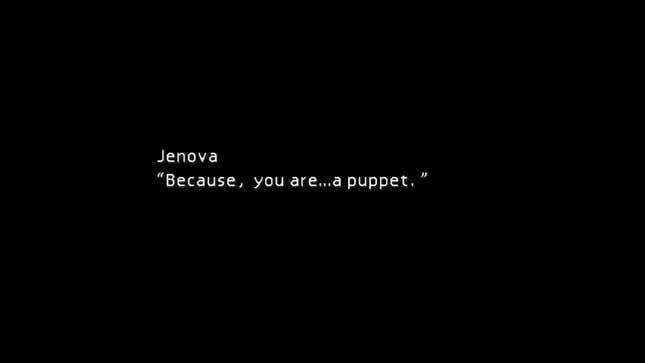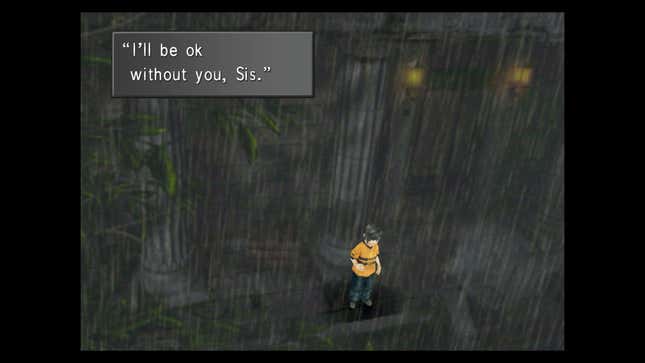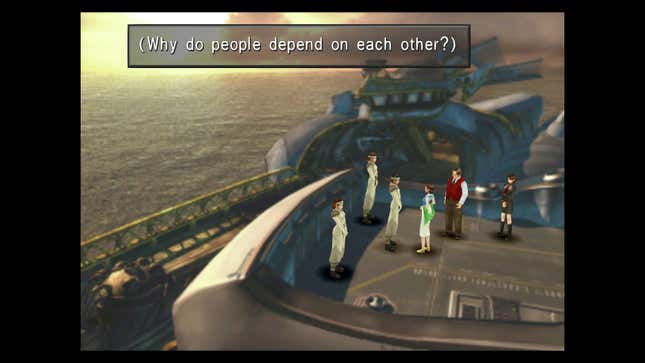After replaying the original, 1997, Final Fantasy VII recently, I knew the next step for me was to immediately jump into Final Fantasy VIII. As my favorite game in the franchise, I can hardly resist any opportunity to play FF8, but this time I felt more encouraged to draw points of comparison and differences between it and FF7. Though they feature totally different worlds, characters, and stories, they work together as almost narrative cousins in an inspiring and fascinating way.
Read More: Final Fantasy VII: The Kotaku Retro Review
Though they have their clear differences, I was always struck by howFF7 and FF8 operate on similar wavelengths. They tell similar stories—albeit with very different tones, and are both a fusion of science fiction and fantasy, utilizing the tech of the ‘90s with 3D models superimposed over pre-rendered backgrounds with fixed camera angles. Playing them often feels like a very similar experience. And, notably, both games feature characters who struggle with memory loss.
But whereas FF7 puts its protagonist, Cloud, through crippling episodes of pain at the reemergence of his memories, FF8 is far more gentle with its cast of orphans, almost as if it wants to imagine a better future and present for them than FF7 affords its cast.
Read More: Playing Final Fantasy VIII In 2024: Everything You Need To Know
FF7’s narrative often feels sinister at times, with bursts of static punctuating the frail mind of the aptly named Cloud Strife, with the menacing threats of the game’s antagonists Jenova and Sephiroth lurking behind every corner. Cloud is rarely afforded a moment to be a normal person, to have normal thoughts. Instead, he spends much of the game posing as someone he’s not.

While FF8’s characters have also lost their memories, they’re allowed more space to be themselves. Protagonist Squall’s realizations and internal monologues are allowed to breathe and mentally wander. FF8 features far more internal monologues, many of which document the characters working through difficult and confusing situations. It’s something that Cloud is rarely afforded the opportunity to do. Squall’s thoughts are befitting of an awkward 17-year-old kid whose childhood memories have faded, as he’s forced to contend with a set of cosmic expectations that are hard to fully comprehend. Whereas Cloud emerges from a far more traumatic past, with sharp internal thoughts that quite literally wound him. Unpacking his memories is a violent ordeal, one that forces him, and his childhood friend Tifa, to go through a surreal and painful journey of recollection.
Read More: Is This Aerith’s Ghost In The Original Final Fantasy VII?
In FF8, the pressures of the geo-political situation around Squall and the other characters are intimidating, no doubt, but the tone is wildly different. This is especially true of the moment the characters regain their memories of themselves and each other.
FF7’s biggest tragedy is impactful, sharp, and harrowing, featuring the irreversible death of a character. FF8 feels like it wants to be kinder to its cast. Moments that could be a matter of life and death, such as deciding how to split the party when Galbadia launches missiles at Balamb Garden, don’t end in irreversible tragedy. FF8’s characters live to see each other again, and live to remember each other in a more gentle way.

The differences in how both games depict their worlds, and the spaces give to the player are also of note. FF8’s Balamb Garden, for example, is a kind of home that FF7’s characters, perhaps with the exception of Red XIII and maybe Yuffie, are afforded. Most places in FF7 are in some state of oppression and tragedy. FF8, though, portrays more normal, varied domestic settings that aren’t as downtrodden and reliant on a risky energy source owned and distributed by a vicious, militant corporation. I often find the world of FF8 more alluring to day dream about because of this. Or, at the very least, it’s a setting that inspires more optimism.
Read More: So You Want To Play The Original Final Fantasy VII?
That difference is what makes playing these two back-to-back always a pleasant experience. It’s easy to walk away from FF7, I think, with a sense of despair and uncertainty. True, FF8’s conclusion is also quite mysterious, but it spends less time under immediate narrative pressure like FF7 does. As a result, playing FF8 immediately after FF7 provides alternate perspectives and inspires different emotional contours. The experience of playing both affords a kind of trans-narrative resolution that’s refreshing in a world dominated by a steady progression of direct sequels, prequels, and remakes in games.

FF8 will always be my favorite Final Fantasy, but I do love thinking of FF7 and FF8 as related to one another, handling similar settings and themes with different approaches. And moving from one universe to a completely different one, as Final Fantasy used to, is the kind of thing I hope the series regains. Much as I’ve enjoyed some sequels like X-2, XIII-2, and both FF7 remake installments, moving across separate worlds while still vibing on compatible themes is something Final Fantasy used to do well, and is in my opinion far more interesting than sequels that offer little more than additional lore dumps.
.
